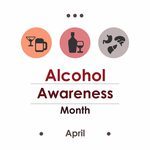At the end of last week, we covered an important subject matter regarding the disease of addiction. Specifically, regarding how substance use and abuse is viewed. The American College of Physicians (ACP) published a position paper recently containing recommendations for reigning in the American opioid addiction epidemic. While opioids were the focus of the organization, what they point out holds true for any mental illness typified by repeated destructive behavior. The ACP states that addiction should be considered a chronic disease, not a “moral disorder or character defect.” If left untreated, it is a mental health disorder that can be fatal.
While the ACP was focused primarily on stemming the tide of opioid use and abuse, their words could be accurately attached to any substance use disorder. Until we do away with the stigma of addiction, countless Americans will not get the help they desperately require. Given that April is National Alcohol Awareness Month, the conversation of stigma is one worth having.
Alcohol Awareness Month
It is worth noting that far more people die in the U.S. from alcohol-related causes each year, than from opioids. Alcohol Awareness Month is sponsored by the National Council On Alcoholism and Drug Dependence (NCADD), which writes that:
“Alcohol Awareness Month provides a focused opportunity across America to increase awareness and understanding of alcoholism, its causes, effective treatment and recovery. It is an opportunity to decrease stigma and misunderstandings in order to dismantle the barriers to treatment and recovery, and thus, make seeking help more readily available to those who suffer from this disease.”
The clear majority of people living with an alcohol use disorder (AUD) do not get the help they need. Like any addiction, alcoholism is a progressive disease that leads to serious health problems and premature death. The stigma that surrounds substance use disorders hinders people’s ability to both seek and get help by way of recovery programs. Through efforts like Alcohol Awareness Month events, we can all have an active role in ending the stigma of addiction.
If you are interested in having a role with Alcohol Awareness Month, please click here.
Do You Need Help?
Alcohol is a pervasive substance, the use of it is, in many ways, a culture. The substance can be easily acquired and even people who do have problem with drug go many years before they are encouraged to seek help. Millions of Americans regularly drink after work or on the weekends socially. As a result, the social aspect of their drinking patterns can easily fool one into thinking they do not have a problem. So, if all your peers drink in a similar fashion, how can you find out if you need help?
Over the weekend, NCADD asked adults to take part in Alcohol Awareness Month Alcohol-Free Weekend (March 31-April 2, 2017). Aside from raising awareness, the days of abstinence were intended to help some people discover that they may have a problem. If you struggled over the weekend, NCADD asked that you contact one of their affiliates, Alcoholics Anonymous (AA) and Al-Anon.
If you have decided that you are, in fact powerless over alcohol and your life has become unmanageable, addiction treatment is likely to be your best course at achieving long term sobriety. Please contact Cottonwood Tucson today. An estimated 20 million individuals and family members are working programs of recovery. It is possible!







